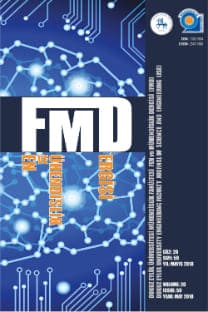MERKEZİ SINAVLAR İÇİN GENETİK ALGORİTMALAR İLE EN İYİ OTURMA PLANI
genetik algoritmalar, optimizasyon, sınav salonu yerleştirme
BEST SEATING PLAN FOR CENTERAL EXAMS USING GENETIC ALGORIHTMS
genetic algorithms, optimization, organizing examination halls,
___
- Anadolu Ajansı, ÖSS'de Skandal: 5 Kardeş Arka Arkaya, Milliyet Gazetesi, 19 06 2005. [http://www.milliyet.com.tr/2005/06/19/son/sontur18.html], Erişim Tarihi: 21.12.2015].
- Shin-ike K. ve Iima H., A Method For Determining Classroom Seating Arrangements By Using A Genetic Algorithm, SICE Annual Conference (SICE), Tokyo, 2011, s. 161-166.
- Krauss B., Lee J., Newman D., Optimizing the Assignment of Students to Classes in an Elementary School, INFORMS Transactions on Education, Cilt 14, 2013, s. 39-44.
- Ross P., Hart E. ve Corne D., Some Observations About Ga-Based Exam Timetabling, Practice and Theory of Automated Timetabling II, Toronto, Springer Berlin Heidelberg, 2006, s. 115-129.
- Qu E., Burke E., Mccollum B., Merlot L. ve Lee S., A Survey of Search Methodologies and Automated System Development for Examination Timetabling, J. of Scheduling, Kluwer Academic Publishers, Cilt 12, No. 1, Şubat 2009, s. 55-89.
- Baeck T. ve Fogel D.B., Evolutionary Computation 1: Basic Algorithms and Operators, New York: CRC Press, ISBN: 978-0750306645, 2000.
- Sivanandam S.N. ve Deepa S.N., Introduction to Genetic Algorithms., New York: Springer Science & Business Media, ISBN: 978-3-540-73189-4, 2008.
- Elmas Ç., Yapay Zeka Uygulamaları, s. 388-298, İstanbul: Seçkin Yayınevi, 2010.
- Haupt R.L. ve Haupt S.E., Practicle Genetic Algorithms, New York: Winley, ISBN: 978- 0-471-45565-3, 2004.
- Mitchell M., An Introduction to Genetic Algorithms (Complex Adaptive Systems), New York: The MIT Press, ISBN: 9780262133166, 1998.
- Nebiyev V., Yapay Zeka Problemler - Yöntemler - Algoritmalar, İstanbul: Seçkin Yayıncılık, 2013, s.100-110.
- Rylander R., Computational Complexity and Genetic Algorithms, Doktora Tezi, University of Idaho, ABD, 2001, s. 1-110.
- Dasgupta D. ve Michalewicz Z., Evolutionary Algorithms in Engineering Aslications, New York: Springer, ISBN 978-3-662-03423-1, 1997.
- ISSN: 1302-9304
- Yayın Aralığı: 3
- Başlangıç: 1999
- Yayıncı: Dokuz Eylül Üniversitesi Mühendislik Fakültesi
YENİLENEBİLİR ENERJİ ALANINDA SOSYAL BİLİNCİN ARTILRILMASI; İSEM: IZMIR YENİLENEBİLİR ENERJİ MÜZESİ
GÜLTER GÜLDEN KÖKTÜRK, HÜMEYRA BİROL AKKURT, AYÇA TOKUÇ
ALP KARADENİZ, MEHMET KUBİLAY EKER
MERKEZİ SINAVLAR İÇİN GENETİK ALGORİTMALAR İLE EN İYİ OTURMA PLANI
Station DATA, Alp KARADENİZ, Mehmet Kubilay EKER, Moment METODU
FREE VIBRATION ANALYSIS OF TIMOSHENKO MULTI-SPAN BEAM CARRYING MULTIPLE POINT MASSES
NEOLİBERAL KENTLEŞMENİN MEKANSAL TEZAHÜRLERİNDEN BİRİ OLARAK REZİDANSLAR: İSTANBUL ÖRNEĞİ
BETONARME YAPILARDA DOLGU DUVAR-ÇERÇEVE ETKİLEŞİMİNİN İNCELENMESİ
